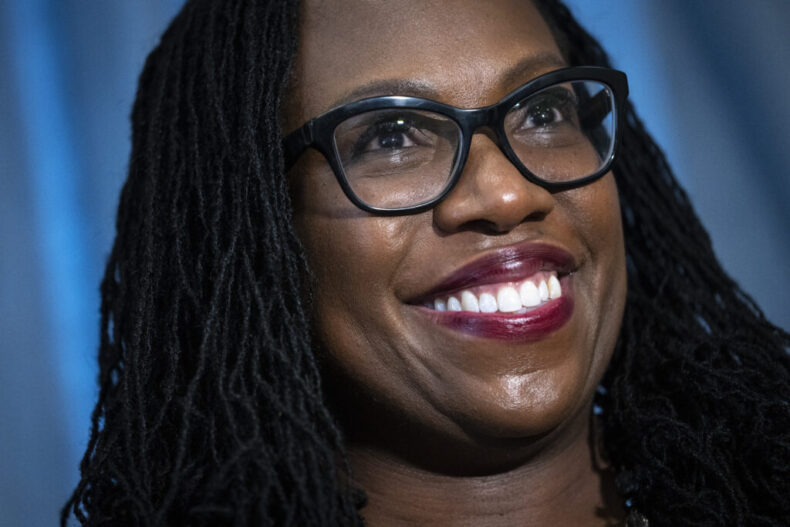Ketanji Brown Jackson was sworn in as a justice in the United States Supreme Court. She broke the imposed glass ceiling, by becoming the first black woman to serve on the nation’s highest court. See here.
Jackson reached this pinnacle at the age of 51. She is the country’s first black female Supreme Court justice. She is the 116th judge of the distinguished court who was appointed in place of Justice Stephen Breyer. She seemed to have previously worked for Justice Breyer.
Chief Justice John G. Roberts Jr. administered her constitutional oath, and Justice Stephen Breyer administered her judicial oath. A brief oath-taking ceremony was held at the honorable court. Justice Jackson was accompanied by her family, which included her two daughters and husband, who attended the ceremony.
She takes charge at a time when the court’s opinions are sharply divided, particularly in the aftermath of its decision to overturn Roe v. Wade and abolish the constitutional right to abortion, and in the aftermath of decisions in which the court demonstrated its deep skepticism of administrative agencies’ ability to address contentious national issues.
The newly increased conservative side will continue to hold a 6-to-3 majority on the court, suggesting that her appointment does not alter its ideological balance.
Anti-abortion protestors who were holding a peaceful sit-in outside the Supreme Court were detained shortly after Justice Jackson was sworn in.
Since 2013, Justice Jackson has served as a federal judge. Three additional female judges are serving on the Supreme Court: Justices Sonia Sotomayor, Elena Kagan, and Amy Coney Barrett. The nine-member court will have four women for the first time on this occasion.
US President Joe Biden nominated Justice Jackson to the Supreme Court in February 2022, kicking off a historic confirmation process for the first black woman to sit on the country’s highest court.
She was nominated a month after Breyer, 83, declared he would step down at the expiration of the court’s term if his successor was confirmed. Breyer’s earlier-than-usual declaration and the restriction he imposed were an acknowledgment of the Democrats’ precarious control of the Senate in a time of extreme partisanship, particularly concerning federal judgeships.
Jackson’s nomination was confirmed by the Senate in early April on a mostly party-line vote of 53-47, with three Republicans voting in favour.
President Biden read a number of her opinions and other writings, as well as those of other candidates, before announcing his intention to nominate her.
Her life story, which included her transition from federal public defender to federal appellate judge, as well as the fact that she was raised as the daughter of two public school teachers and administrators, left an impression on him.
Justice Ketanji Brown Jackson’s journey to the Supreme Court at a glance,
Ketanji Onyika Brown was born on September 14, 1970, in Washington, D.C. Historically, both of her parents attended black colleges and universities.
Jackson worked as a law clerk for several judges after graduating from law school.
In addition, she worked as Stephen Breyer’s law clerk from 1999 to 2000.
Jackson was put forward by Barack Obama on July 23, 2009, for the position of vice chair of the US Sentencing Commission. On February 11, 2010, she was unanimously approved by the U.S. Senate. She went on to serve on the Sentencing Commission till 2014.
In Sep 2012, she was nominated by then President Obama to fill the vacancy left by retiring Judge Henry H. Kennedy Jr. on the United States District Court for the District of Columbia.
In early 2016, Obama administration officials considered Jackson as a potential nominee to the United States Supreme Court to fill the vacancy left by Antonin Scalia’s death. Jackson was one of five persons interviewed as a possible candidate for the position.
She now serves as a judge at the US Supreme Court.












